The Intel Kaby Lake-X i7 7740X and i5 7640X Review: The New Single-Threaded Champion, OC to 5GHz
by Ian Cutress on July 24, 2017 8:30 AM EST- Posted in
- CPUs
- Intel
- Kaby Lake
- X299
- Basin Falls
- Kaby Lake-X
- i7-7740X
- i5-7640X
Benchmarking Performance: CPU Office Tests
The office programs we use for benchmarking aren't specific programs per-se, but industry standard tests that hold weight with professionals. The goal of these tests is to use an array of software and techniques that a typical office user might encounter, such as video conferencing, document editing, architectural modeling, and so on and so forth.
All of our benchmark results can also be found in our benchmark engine, Bench.
Chromium Compile (v56)
Our new compilation test uses Windows 10 Pro, VS Community 2015.3 with the Win10 SDK to compile a nightly build of Chromium. We've fixed the test for a build in late March 2017, and we run a fresh full compile in our test. Compilation is the typical example given of a variable threaded workload - some of the compile and linking is linear, whereas other parts are multithreaded.
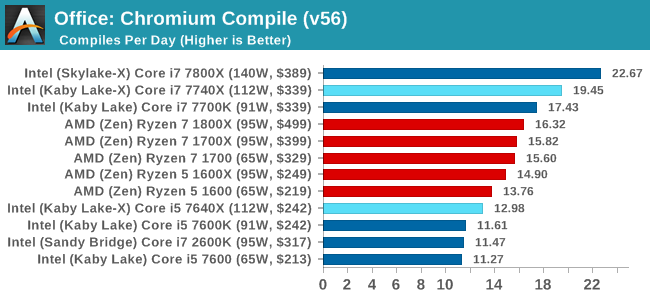
Our Chrome Compile test is a mix of load, but also loves L3 cache. We've seen before that the L3 victim cache on AMD can be a defecit here, but even then the Core i5 cannot overcome the 3:1 thread deficit to the Ryzen 5 CPUs. The Core i7-7740X hits the nail on the head for threads and single thread performance, although users that play in this space would look straight to the Core i7-7800X, and likely decide that +16.5% better performance is worth the +18.2% extra cost.
PCMark8: link
Despite originally coming out in 2008/2009, Futuremark has maintained PCMark8 to remain relevant in 2017. On the scale of complicated tasks, PCMark focuses more on the low-to-mid range of professional workloads, making it a good indicator for what people consider 'office' work. We run the benchmark from the commandline in 'conventional' mode, meaning C++ over OpenCL, to remove the graphics card from the equation and focus purely on the CPU. PCMark8 offers Home, Work and Creative workloads, with some software tests shared and others unique to each benchmark set.
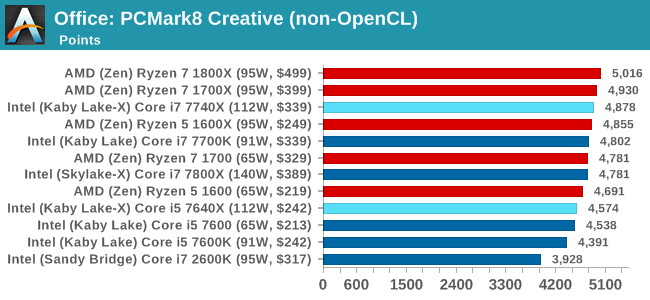
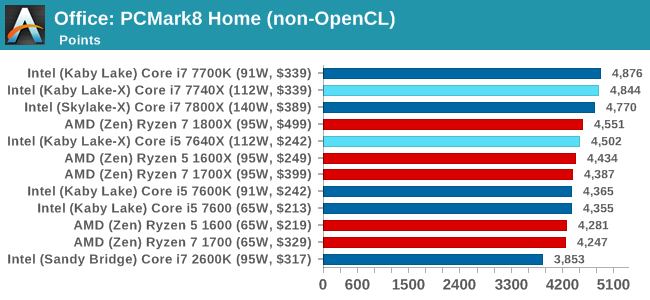
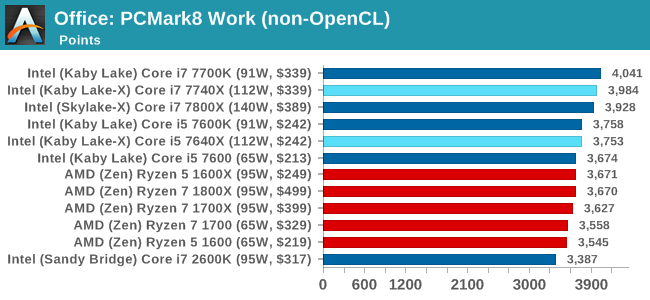
SYSmark 2014 SE: link
SYSmark is developed by Bapco, a consortium of industry CPU companies. The goal of SYSmark is to take stripped down versions of popular software, such as Photoshop and Onenote, and measure how long it takes to process certain tasks within that software. The end result is a score for each of the three segments (Office, Media, Data) as well as an overall score. Here a reference system (Core i3-6100, 4GB DDR3, 256GB SSD, Integrated HD 530 graphics) is used to provide a baseline score of 1000 in each test.
A note on context for these numbers. AMD left Bapco in the last two years, due to differences of opinion on how the benchmarking suites were chosen and AMD believed the tests are angled towards Intel processors and had optimizations to show bigger differences than what AMD felt was present. The following benchmarks are provided as data, but the conflict of opinion between the two companies on the validity of the benchmark is provided as context for the following numbers.
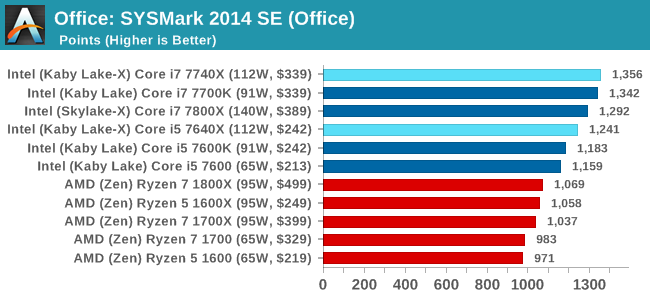
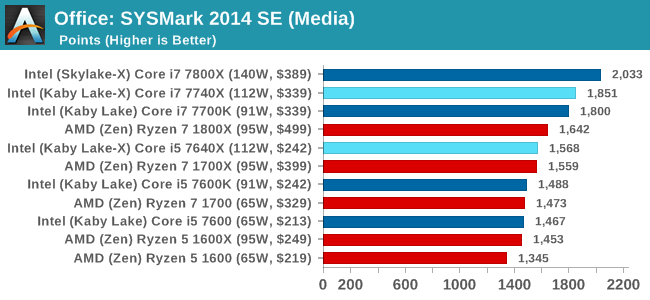
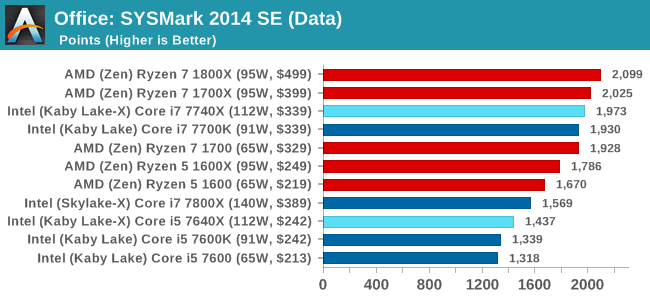
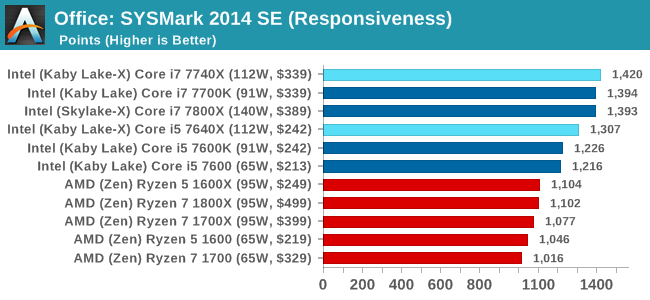
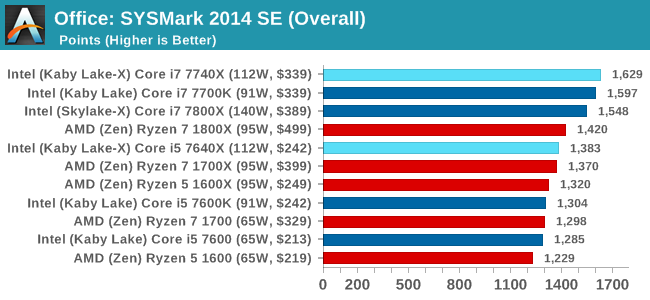










176 Comments
View All Comments
Gulagula - Wednesday, July 26, 2017 - link
Can anyone explain to me how the 7600k and in some cases the 7600 beating the 7700k almost consistenly. I don't doubt the Ryzen results but the Intel side of results confuses the heck out of me.Ian Cutress - Wednesday, July 26, 2017 - link
Sustained turbo, temperatures, quality of chips from binning (a good 7600 chip will turbo much longer than a 7600K will), time of day (air temperature is sometimes a pain - air conditioning doesn't really exist in the UK, especially in an old flat in London), speed shift response, uncore response, data locality (how often does the system stall, how long does it take to get the data), how clever the prefetchers are, how a motherboard BIOS ramps up and down the turbos or how accurate its thermal sensors are (I try and keep the boards constant for a full generation because of this). If it's only small margin between the data, there's not much to discuss.Funyim - Thursday, August 10, 2017 - link
Are you absolutely sure your 7700k isn't broken? It sure looks like it is. I understand your point about margins but numbers are numbers and yours look wrong. No other benchmarks I've seen to date aligns with your findings. And please for the love of god ammend this article if it is.Hurr Durr - Monday, July 24, 2017 - link
One wonders why would you relegate yourself to subpar performance of AMD processors.Alistair - Tuesday, July 25, 2017 - link
Your constant refrain belonged in the bulldozer era (when the single threaded performance difference was on the order of 80-100 percent). Apparently you can't move past the Ryzen launch. If a different company such as Samsung had launched these CPUs the reception would have been very different. I've never bought AMD before but my Ryzen 1700 is incredible for its price, and I had to be disillusioned by my terrible Skylake upgrade first before I was willing to purchase from AMD.Gothmoth - Tuesday, July 25, 2017 - link
don´t argue with trolls....StevoLincolnite - Tuesday, July 25, 2017 - link
Why would Intel enable HT when they could sell it as DLC?https://www.engadget.com/2010/09/18/intel-wants-to...
coolhardware - Tuesday, July 25, 2017 - link
Glad to hear that the benchmarking is (becoming) less of a chore :-) Kudos and thank you for the great article!fallaha56 - Tuesday, July 25, 2017 - link
Surely that AVX drop -10 when overclocking was too much?What about delidding?
Samus - Monday, July 24, 2017 - link
It still stands that the best value in this group is the Ryzen 1600X, mostly because it's platform cost is 1/3rd that of Intel's HEDT. So unless you need those platform advantages (PCIe, which even x299 doesn't completely have on these KBL-X CPU's) it really won't justify spending $300 more on a system, even if single threaded performance is 15-20% better.Just the fact an AMD system of less than half the cost can ice a high end Intel system in WinRAR speaks a lot to AMD's credibility here.